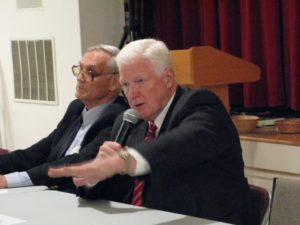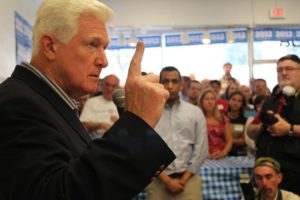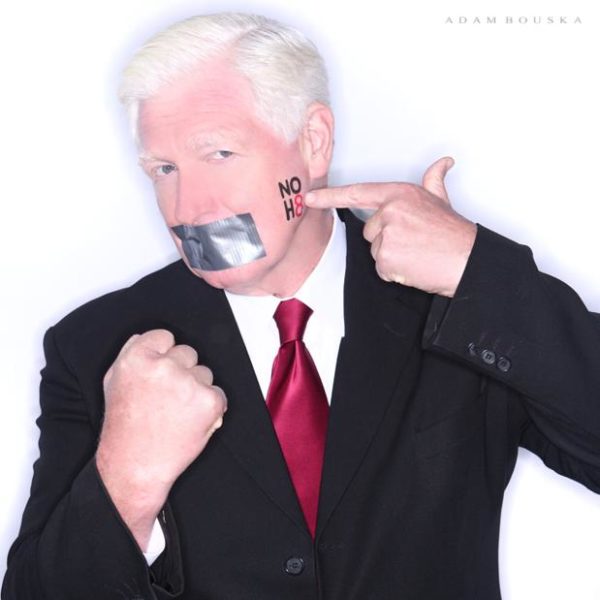The controversies that began to pile up for Rep. Jim Moran in the late 1990s and 2000s galvanized his critics and spurred more organized efforts to unseat him.
All the while, the federal government continued to grow and as Moran’s district became more affluent and stayed as liberal as ever, the politician continued to get re-elected by a comfortable margin.
There was always a fight, however — until this year.
“It’s the first time in 35 years that I haven’t had an opponent in the primary or the general election,” Moran says. “Nobody had emerged wanting to challenge me. If someone was challenging me, I wasn’t going to let them suggest for a moment that I would back down from the competition.”
Few believe Moran would back down from a fight, even if it were in his best interest. They say that’s what makes him unique.
“He never seemed like a rank-and-file member,” said Don Beyer, a long-time constituent of Moran’s and now the Democratic candidate to replace him. “His personality is too big and his heart is too big. He’s incredibly bright, but he has incredible compassion, which can come off as anger.”
But Moran’s critics describe his outbursts as thuggery, bringing up that his wife reportedly told police that the former boxer grabbed her.
“He’s like a mafia don,” says Patrick Murray, a Republican who ran against Moran in 2010 and 2012. “He’s a big, scary angry guy and you don’t want to get on his bad side. That’s part of how he maintained his power here.”
*******
The image of Moran the intimidator was reinforced in 2010, when a group of Tea Party protesters were heard shouting at his staff in his Capitol Hill office. It didn’t sit well with Moran, who former press secretary Anne Hughes says acted as a caring — and protective — father to his staff.
Moran confronted the protesters, according to a Politico story published at the time. His staffers got between him and the activists, who asked why he needed “bodyguards” to protect him. That prompted a memorable line from an unidentified staffer.
“We’re not protecting him from you,” the staffer told the unwelcome visitors, “we’re protecting you from him.”
Moran downplays the “former amateur boxer” reputation, though he says he did once fight an exhibition match with one-time world heavyweight champion Joe Frazier.
“He toyed with me,” Moran says with a smile. “He let me punch him when he could have dropped me anytime he wanted.”
Moran’s father, James P. Moran, Sr., was a phenomenal athlete. He was an offensive guard at Holy Cross in Worcester, Mass., where he was an All-American before he continued his career with the Boston Redskins, before they moved to Washington.
Moran, Jr., also played football at Holy Cross on a dual athletic/academic scholarship. His father taught him to fight — “he drilled into our minds that only sissies need guns” — and to stick up for those less fortunate.
“I used to get in fights when I was young, but never to defend myself,” Moran says. “There were two or three cases where I saw a bunch of bullies harassing a young kid who couldn’t defend himself and I intervened.”
In his adult life, Moran said he isn’t thrilled with being labeled a fighter outside of the political arena.
“I think most of it is exaggerated,” he says.
*******
 Rep. Frank Wolf (R-Va.) has served in Congress even longer than Moran, representing the Loudoun, Clarke, Frederick and Warren counties, plus parts of Fairfax and Prince William counties for 33 years. The two have been friends for decades, despite their disagreements on national issues.
Rep. Frank Wolf (R-Va.) has served in Congress even longer than Moran, representing the Loudoun, Clarke, Frederick and Warren counties, plus parts of Fairfax and Prince William counties for 33 years. The two have been friends for decades, despite their disagreements on national issues.
“I’ve always liked him,” Wolf said of Moran, with whom he serves on the House Appropriations Committee. “It doesn’t mean we always agree, particularly on the national issues, but we’re friends. The local issues that have no political ramifications, we’ve had a history of working with one another, and our staffs have had a history of working with one another, and I think it’s good for the region.”
Moran’s fire is just as apparent during hours-long budget negotiations as when he’s in front of a camera or crowd, Wolf said.
“Jim is very passionate,” Wolf says. “He cares deeply. The very fact that there is passion and intensity, that’s who Jim is. I see it time after time after time in the appropriations process. Amendments come up and he’ll get up and speak for them.”
Wolf and Moran worked together to secure federal funding for the Metro system, including the new Silver Line. Moran was also instrumental in allowing Arlington to try to curb predatory towing, County Board Chair Jay Fisette said.
“I got incensed that we had no regulatory authority to protect people from abusive tow industry practices,” Fisette said. “Jim worked at this over several years and effectively changed the system to allow state and local governments to regulate the industry.”
Fisette also highlighted Moran’s work to give Arlington access to the Potomac River, which freed the county to plan to build a boathouse near Rosslyn, as well as to preserve the ecosystem of Four Mile Run.
As a former local politician, Moran knows what local governments need and how to work with them, Fisette says.
“Many people in Congress and the state who don’t have local government experience either take us for granted or dismiss us,” Fisette says. “Jim has always understood the complexity, importance and value of city or county governance.”
Beyer says he thinks Moran, who is credited with bringing federal jobs and spending to the district, shines at constituent services — a tradition he hopes to carry on if he defeats Republican Micah Edmond on November 4.
“I campaigned at the firehouse primary in February, and it was remarkable the number of people who said ‘I love Jim Moran,’ and it was largely for constituent services,” Beyer said.
Even Moran’s critics admit he’s done plenty of good for the district, but say he should not be heralded for that.
“Any member of Congress who has a heartbeat and wants to get re-elected provides good constituent services,” Murray says. “That’s a particularly low bar to set for any congressman doing a good job.”
*******
 Although Moran’s says his first reason for not running for re-election was the lack of a fight, how tough and unending the fight has become on the Capitol comes in a close second.
Although Moran’s says his first reason for not running for re-election was the lack of a fight, how tough and unending the fight has become on the Capitol comes in a close second.
“It’s not just that we’re not productive, in many cases we’re counterproductive in the things that we do,” he says.
The tipping point, however, was in January 2013, when President Barack Obama extended the Bush tax cuts in order to avoid a government shutdown. Moran says Obama “was holding all the face cards in his hand. He had all the leverage that any president could ever imagine and he chose to fold and split the pot, to continue the analogy.”
Moran says the decision means the appropriations committee will now be tasked with cutting $3.9 trillion in domestic, discretionary spending over the next 10 years. He voted against the deal, and split with the Congressional Progressive Caucus. He was one of just six Democrats to vote against it.
“Unfortunately, I could hear my Democratic colleagues saying ‘Hey, Moran’s just out of control on this, he’s so upset over what we’re doing,'” Moran says. “I told the Progressive Caucus, ‘if you guys don’t understand this and vote the wrong way, I never want to attend another progressive caucus meeting again for the rest of my career,’ and that’s what happened.”
It was a surprising move on the Hill, but anyone who knows Moran knows it doesn’t matter who he’s fighting. When he believes in his cause, he won’t leave the ring until the fight is over.
Ed. Note: This is the second of a three-part series. You can view Part One here. Part Three is now available. Courtesy photo (top).


